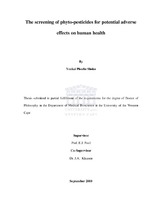| dc.description.abstract | Pesticides are designed to control or eliminate pests such as insects, rodents, weeds, bacteria, and fungi. They are used at a global scale for agricultural produce. Although pesticides play a significant role in increasing food production and eliminating diseases, exposure to pesticides may be harmful to non-target organisms. As a result concern over safety and esistance to pesticides has increased and there is pressure to reduce use and search for more environmentally and toxicologically safe and efficacious pesticides. Most pesticides currently in use are synthetic; therefore an alternative to synthetic pesticides is the use of naturally occurring products/ botanicals with pesticidal properties. Two plants indigenous to South African with pesticidal properties were chosen for this study. Dicerothamnus rhinocerotis (D. rhinocerotis) and Galenia africana (G. africana) have potential antifungal properties thus, may have potential use on agricultural produce as fungicides. Galenia africana and D. rhinocerotis extracts inhibit growth of B. cinerea (a fungal pathogen) at concentrations greater than 31.25 mg/ml and 125mg/ml respectively. A major consideration in approving pesticides for use is whether they pose
an unreasonable risk to humans and to the environment. Toxicity studies are required to determine the safety of the plant extracts.
The purpose of this study was to evaluate potential toxicity of ethanol extracts of D. rhinocerotis and G. africana, which is important when designing practices to reduce or eliminate excess exposure to them. Natural plant products with pesticidal properties could provide an alternative to synthetic pesticides and may thus effectively reduce resistance levels. This first objective of this study was to assess the cytotoxicity of D. rhinocerotis and G. africana on human cell cultures. Human whole blood and the human breast adenocarcinoma cell line (MCF-7) were treated with varying concentrations of the plant extracts and cytotoxicity determined. Cytotoxicity was measured using several biomarkers. Inhibiotory concentration for a 50% effect (IC50) and no observable effect
level (NOEL) values were obtained for D. rhinocerotis and G. africana. The results showed that extracts of D. rhinocerotis and G. africana had cytotoxic effects on the cell cultures. The second objective of this study was to determine the ecotoxicity of D. rhinocerotis and G. africana. A series of acute toxicity tests, with effective concentration for a 50% effect (EC50) and lethal concentration for a 50% effect (LC50) as biomarkers, were
conducted to estimate the potential environmental effect of the two plants. The tests were carried out using Vibrio fischeri, Selenastrum capricornutum, Daphnia pulex, and Poecilia reticulata as bioindicators. Results obtained showed that G. africana had higher toxicity units than D. rhinocerotis, thus showing that G. africana is more toxic to the aquatic species used as compared to D. rhinocerotis. The third objective of this study was to investigate the immunomodulatory effects of the two plant extracts. This was achieved by using mouse spleen cell cultures. Exposure of pesticides to the immune system may result in alteration of the normal immune functions. The cytokines IFN-γ and IL-4 were used as biomarkers to determine the T-cell activity of the immune system when exposed to the two botanical products. The results obtained showed that both D. rhinocerotis and G. africana decrease of the cytokines interferongamma
(IFN-γ) and interleukin-4 (IL-4), thus may have immunotoxic effects.
The fourth objective was to investigate the hepatotoxicity of the two plant extracts. Injury to the liver was investigated using a range of clinical biochemical tests that monitor liver enzyme activity and metabolic activity. Primary liver cell cultures were exposed to the plant products in question, after which the biochemical tests were carried out. The enzymes that were monitored were alanine aminotrasferase (ALT), aspartate aminotransferase (AST), alkaline phosphatase (ALP) and lactate dehydrogenase (LDH). The results obtained showed that both of D. rhinocerotis and G. africana may have effects on the liver, as shown by the increased levels of enzymes released from cells upon exposure to plant extracts. The final objective of this study was to investigate the effect of the two plants on the male reproductive system. Injury to the male reproductive system was investigated using testicular cell cultures. Primary cell cultures were stimulated with luteinizing-hormone (LH) and exposed to the plant extracts. LH results in the production of testosterone, thus
testosterone was used as a biomarker for assessing reproductive toxicity. The results obtained showed that both of D. rhinocerotis and G. africana have effects on the male reproductive system, as shown by the decreased testosterone secretion. Botanicals provide a simple, inexpensive and environmentally friendly (non-pollution and lesser toxicological concerns) alternative for pest control. However, motivation for the commercial use of botanicals as pesticides requires validating the efficacy of the plant as a pesticide, and also assessing its effects on human health and the environment. An important component of this evaluation involves toxicity studies, which enables cautions of dangerous practices and toxic effects of the plants to be issued. | en_US |

